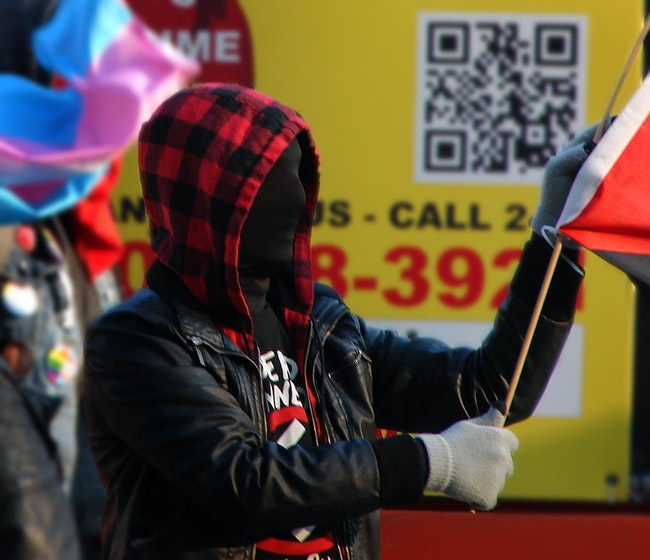 An anti-fascist counterprotester at a Patriot Prayer rally. (Courtesy/Wikimedia Commons)
An anti-fascist counterprotester at a Patriot Prayer rally. (Courtesy/Wikimedia Commons)
Legislation targeting mask-wearing rioters has drawn criticism from a coalition of civil rights and community organizations that say it’ll have a chilling effect on protests while setting the state back on its efforts to halt mass incarceration.
Speaking before the House Rules Committee on Thursday, Rep. Sherrie Sprenger, R-Scio, said she sponsored the bill in response to reports of protests in Oregon turning into riots with participants wearing masks to shield their identities.
She specifically mentioned an incident where people wearing masks blocked an intersection and confronted an older driver trying to get through. She also mentioned a planned rally by the KKK in Portland that was cancelled.
The current version of House Bill 4126 would increase the crime of rioting from a Class C to a Class B felony if a defendant wore a mask during a riot with the intent to conceal their identity. A Class C felony is punishable by 5 years in prison, while a Class B felony is punishable by a fine of up to 10 years in prison.
In response to concerns about the bill, Sprenger has proposed removing the increased penalties for rioting while wearing a mask. Instead, the bill would allow judges to impose stiffer penalties on someone who commits a crime if they wear a mask to avoid getting caught.
“This bill does not create a new crime,” she said. “This bill does not infringe on First Amendment rights.”
Courtney Helstein, lobbyist for the American Civil Liberties Union of Oregon, said that while the amendment improved the legislation, her organization still opposed it.
She said that there is wide surveillance of protests and there are many “legitimate, constitutionally protected” reasons why someone would wear a mask to a protest, such as wearing a bandana in case police use tear gas. She said other reasons could include health reasons, fearing retaliation from a landlord or employer, as well as not wanting to be tracked by a domestic abuser.
Helstein said that peaceful protestors could find themselves entangled in an escalating situation in a large crowd and be charged with rioting. While they could contest any resulting criminal charges, they would still face arrest, have to hire a lawyer and take time off work.
“It’s kind of a fear of folks who could get caught up in something they never intended to be a part of,” she said.
On Thursday, 10 groups including the ACLU, Oregon Criminal Defense Lawyers Association, the Latino Network, Native American Youth and Family Center and others presented the committee a letter opposing the bill.
The letter stated that the legislation would have a “chilling effect” on activities protected by the First Amendment. It noted that protests are often monitored by police and immigration authorities, referencing a report of law enforcement spying on opponents of a pipeline in Coos County.
The letter also said that the bill runs counter to Oregon’s efforts to reduce mass incarceration.
“This bill will only serve to ramp up charges, frighten defendants into accepting plea agreements, and lead to longer prison sentences,” the letter stated.
Aaron Knott, the legislative director for the Oregon Department of Justice, told the committee that agency didn’t have constitutional concerns about the bill. He said that for the bill’s penalties to apply, someone would have to be convicted of a crime and a judge would have to find that they intentionally wore the mask to get away with it.
He also noted that the state constitution gives people the right to cover their faces for broad reasons.
“If my intent is to dress like Batman, not dress like Batman to avoid apprehension, then I should be fine,” he said.
Zakir Khan, the board chair of the Oregon chapter of the Council on American-Islamic Relations, sharply criticized the bill as “prototypical of a fascist enterprise rather than a democratic state.”
He mentioned anti-fascist, or “antifa” activists in Eugene and Portland, who have been known to wear masks, and how they rallied around the Muslim community after attacks. He said there is a fascist movement seeking to make the state less democratic and inclusive.
“This legislation is right up that ally,” he said.
Sprenger pushed back on suggestions she supported fascism.
“I am none of that or any innuendo to that,” she said.
The bill, which has already been considered by the House Judiciary Committee, is scheduled for a vote by the committee on Friday.
Earlier in the session, a different bill creating a new crime of threatening a church or school was scuttled by the House Judiciary Committee out of concerns of adding penalties to state law.
However, Rep. Tawna Sanchez, a Portland Democrat who chairs the House Judiciary Committee, voted to advance the bill enhancing penalties for wearing a mask during a riot. Sanchez did return a request for comment.
Contact reporter Jake Thomas at 503-575-1251 or [email protected] or @jakethomas2009.









